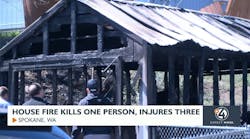April 28--He thought he was calling his grandmother.
"I love you."
But the little boy, using a cellphone, had actually dialed 911 on a recent Friday. He would eventually tell the dispatcher that he was 2.
She patiently, gently, asked him whether there was a grown-up in the house. There was, the boy said, but he was sleeping.
"Daaad! Wake up!"
It took authorities 10 minutes to confirm where the child was calling from and send officers to check on his welfare. Try as he might, the boy could not awaken his loudly snoring father, who slept through even his infant son's wails.
Young children in Wichita call 911 every day -- several times a day, in fact.
On a typical day, Sedgwick County Emergency Communications receives about 10 calls from children younger than 10, officials say. Two or three of those calls come from children younger than 5. Those numbers don't include prank calls.
"I have talked to a number of children," said Maj. Laura Meyers, who oversees quality assurance and training for the emergency communications center. "For the most part, they're very cooperative.
"They will give you the information you ask for. It seems like they're usually very willing and very helpful and very attentive."
But learning that information from young children isn't always easy. Dispatchers are trained to lower their voices, use simpler words and talk more slowly with children.
"You are going to have to be more patient," Meyers said.
Small children don't always know their home address or their phone number, so dispatchers will ask whether there is some mail nearby. They'll ask whether there's a school or park nearby and whether the child knows its name.
"Historically, child callers are calmer than adult callers," said Kim Pennington, director of emergency communications for Sedgwick County.
Adult callers can be loud -- even hysterical -- when calling, even about things that turn out not to be serious, she said.
"Children don't have that knowledge baggage that they've brought with them," Pennington said. "I think that's one of the reasons they stay calmer."
It helps, Meyers said, that many of the dispatchers are parents of young children.
"A lot of us are used to dealing with the mindset of a 2-year-old child," she said.
The 911 calls from children are a good sign, Pennington said. The department does a lot of public education with children on when and why to call 911.
"They still prank us from time to time, but that's getting further and further away as we get closer to being able to tell where they're calling from," she said.
The most important details children can give 911 dispatchers are their address and phone number, Pennington said, so parents should make teaching that information a priority.
Often, children think they're talking to firefighters or police officers when they call 911.
"We don't mind being called that," Meyers said. "I don't think it warrants them being corrected."
It can take dispatchers several minutes to confirm where a cellphone call originates, Pennington said, depending on the location of satellites used to triangulate the call's signal. Even then, the result may be an incorrect address.
When officers arrived at the little boy's apartment earlier this month, the dispatcher asked him whether he could unlock the door.
"Are you here?" he asked.
"Someone's there to check on you," the dispatcher said cheerfully.
"I'm coming," the boy replied, the sound of him scurrying across the room audible on the call.
When officers greeted him, he said, "I was talking to you."
Reach Stan Finger at 316-268-6437 or [email protected]. Follow him on Twitter: @StanFinger.
Copyright 2014 - The Wichita Eagle





